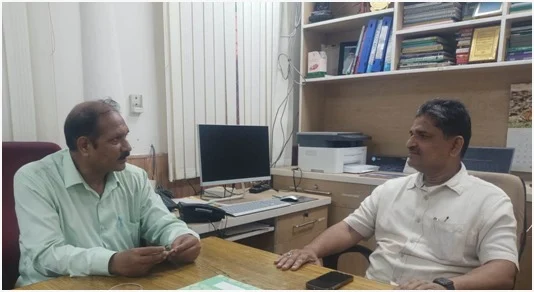MOHAMMAD JAWED, a Member of Parliament from Kishanganj constituency, has voiced strong criticism of the recent budget, labeling it as “illusionary” and failing to address the needs of minorities, Dalits, and weaker sections. Jawed, who also serves as a Whip of the Congress Party in the Lok Sabha, shared his thoughts in an interview with MOHD NAUSHAD KHAN.
How difficult or easy was it for you to win the election from Kishanganj?
The people of Kishanganj have always supported the Congress. I am deeply grateful to my constituents for believing in me and voting for my victory. Their faith in our party leader, Rahul Gandhi, has strengthened over the years. This made winning the election less challenging.
During my last tenure, I focused on infrastructure projects like roads and bridges, and now I plan to bring industries to Kishanganj. Maintaining peace has been a priority, and I have not allowed anyone to disturb the peaceful atmosphere.
As an MP, what are the challenges you face in your constituency?
Kishanganj is one of Bihar’s most distant districts and has been continuously neglected by the state government. Major challenges include lack of proper educational institutions and health infrastructure. The shortage of workforce in government departments hinders the quality and pace of work, leading to corruption and hardships for the people. We are also continuously raising the issue of AMU Kishanganj center, which was a gift from Sonia Gandhiji to address the lack of educational centers.
Any specific demands for the AMU Kishanganj center?
The land has been allotted by the government, and construction should commence. New courses need to be started, and more teaching and non-teaching staff should be appointed. I have been advocating these demands within my party, and I hope we receive what is due sooner rather than later.
What issues will you raise in Parliament for your constituency, considering the current national situation?
I will definitely raise issues related to education and health. The Prime Minister has promised a government medical college in every district, and this budget has announced more colleges. Kishanganj urgently needs a medical college. When the second AIIMS was proposed for Bihar, Kishanganj offered a 200-acre plot, but the government did not accept it. I will continue to push for AIIMS in Kishanganj. Another pressing issue is soil erosion during rains, which affects many villages. The migrant population of Bihar, who often live under inhuman conditions, also needs attention. We will also address issues outside Parliament, including the targeting and demolition of mosques and madrasas, and instances of violence and lynching. With more numbers, we will raise these issues more forcefully.
Has the prevailing hate atmosphere in India impacted Bihar?
The BJP thrives on a communal agenda, gaining votes through polarization and demonizing minorities, including Muslims, Dalits, Tribals, and marginalized sections. However, their divisive tactics backfired in the last election. The BJP needs to focus on the well-being of the people and address core issues like unemployment, price rise, and law and order, providing a sense of security.
How will the lack of special status for Bihar in the budget play out politically?
The budget mentioned Bihar but offered nothing special, only routine announcements. It appears illusionary, as everyone knows about Modi’s empty promises. Prime Minister Modi had announced 1.25 lakh crore for Bihar, but not even 25 crore has been delivered.
Was the budget on expected lines, and can it be considered inclusive?
The budget was disappointing, with nothing for anyone. While the price of gold and silver was reduced, the rising cost of vegetables and essential commodities concerns more than 90% of the people. There was no focus on schools and colleges. The government is offering loans but not establishing national institutions where the poor can get free education.
Congress party president said there are no revolutionary schemes for minorities and others. What’s your take?
Not only minorities but everyone has been neglected. Instead of providing for minorities, the government has taken away existing benefits, such as scholarships offered during the UPA regime.
As a coalition government, was an inclusive economic policy and budget expected but not delivered?
The problem is that India is run by a few individuals focused solely on winning elections, not on governing effectively. With a divisive agenda, inclusive economic policies and budgets are impossible.
What do you think about the recent bridge collapses in Bihar?
The Chief Minister, who has been in power for over 20 years, relies more on bureaucracy than elected representatives, leading to corruption. Both the Chief Minister and Prime Minister have misled people with promises of good governance and development but have delivered very little.
How will the Lok Sabha polls verdict impact the assembly election in Bihar?
We are hopeful that we will form the government in Bihar, as people are tired of hate and divisive politics.
Has the championing of social justice in Bihar weakened over the last decade?
Divisive politics inevitably impacts society. Poisoning the hearts and minds of people is harmful to both the state and the country.
Mohammad Jawed’s critique of the recent budget reflects a broader dissatisfaction with the current government’s approach to governance and development. His concerns highlight the ongoing challenges faced by his constituency and Bihar at large, from inadequate infrastructure and education to communal tensions and economic neglect.


